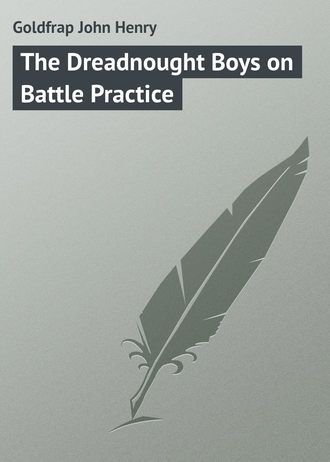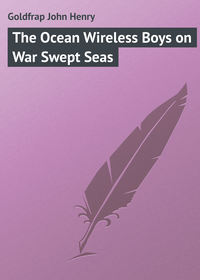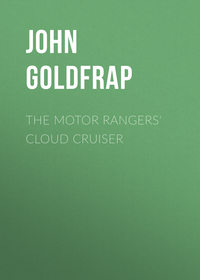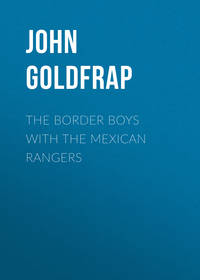 полная версия
полная версияThe Dreadnought Boys on Battle Practice
The Dreadnought Boy was then rudely yanked to his feet. As he stood upright, he noticed a faint, sickly smell in the air.
Chloroform!
The inventor's figure, white-faced and outstretched as though in a deep sleep, lay a few paces away. His stupor showed to what purpose the drug had been put.
"He'll give us no more bother," grinned Pulsifer, nodding in the direction of the recumbent inventor, over whom the scowling Silas stood guard.
"Got any left for the kid, if he gets mussy?" inquired Kennell.
"No, confound it," muttered the younger Pulsifer; "the stuff upset and spilled on the grass."
"I should say it did. The place smells like a medical college," commented Kennell. "Now, guv'nor, where's the gasoline gig?"
"Two of you fellows pick up Varian," ordered Pulsifer, "and follow me. Kennell, you take care of the boy – wherever he came from. Tie his hands. The rig is right outside the rear gate of the grounds."
Ned, helpless as he was, had no recourse but to obey Kennell's rough order to "Look alive." In the meantime the traitorous Silas roped the lad's hands. In a few minutes they reached the back gate. Outside it stood a powerful touring car.
There was a lamp on the rear gate, and Pulsifer, as he went by, reached up to turn it out.
"The less light we have, the better. No knowing who is skulking around," he remarked. As he straightened up to reach the lamp, however, his eyes fell on Ned, whose face was illumined momentarily by the light.
Pulsifer gave an exclamation of delight.
"Look who's here, Dave," he cried exultingly; "little Johnny Fixit. Don't you remember him?"
"Why," exclaimed the elder Pulsifer, "that's one of the rowdy kids who tried to get us out of our seats on the subway."
"Tried to," thought Ned; "I guess we came pretty near doing it."
"Oh, this is luck," grinned the younger Pulsifer; "talk about killing two birds with one stone. We'll attend to you, my young friend – you dirty young spy. We'll put you where what you overheard to-night will do you no more good than – this."
He stepped lightly forward and deliberately struck the Dreadnought Boy an open-handed slap on the cheek.
Ned's hands struggled with the rope that Kennell had twisted about his wrists. He palpitated, ached, and longed with a superhuman intensity, to get at the younger Pulsifer, and beat his sneering face into an unrecognizable mass. It was a lucky thing for that young man that Kennell had tied his knots with sailor-like thoroughness. In a few minutes – by the time they had been bundled into the tonneau of the machine, in fact – Ned was once more calm. He recognized the stern necessity for keeping absolutely cool.
On the seat beside him in the tonneau lay the senseless form of the inventor. As a guard, Kennell, Schultz and Hank were seated also in that part of the car. Dave Pulsifer took the wheel and his brother sat at his side. Silas, the heavy-browed, occupied the small extension-seat at the elder Pulsifer's side.
With the engine muffled down, till it made scarcely any noise, the car glided off into the night, leaving behind it what Ned could not help feeling was the last hope of rescue.
As the wheels began to revolve, Dave Pulsifer leaned back, and, with one hand, extended to Kennell a revolver.
"If our guests should object to our little surprise party and moonlight ride, just give them a leaden pill," he suggested pleasantly.
"Say, guv'nor, it would be pretty dangerous firing off a gun at this time of night, wouldn't it? It might bring the alligator-zills, or whatever they call these Cuban cops, about our ears, mightn't it?"
The younger Pulsifer laughed lightly.
"No danger of that," he said. "In ten minutes now we'll be out in a desolate part of the country, inhabited only by a few cattle-grazers, and they've got too much horse-sense to inquire into a casual shot. So don't hesitate to pepper away if our guests get obstreperous."
A few minutes later the car began to bound forward, the elder Pulsifer "opening her up," as they drew out of the few scattered huts on the outskirts of the town. They emerged into an arid, stony region, fringed with low, barren hills, clothed with scanty vegetation. Huge cacti stood up weirdly, like tombstones in the moonlight, and a few half-starved cattle plunged off to both sides of the track as the car sped along.
So far as one of the prisoners becoming obstreperous was concerned, there was no danger, or immediate danger, at any rate. Henry Varian lay like one dead, with his face of a marble whiteness, in the cold moonlight.
"Say, the guv'nor must have given him a pretty heavy dose," muttered Kennell, bending over the inventor and feeling his heart. "I hope he hasn't overdone it."
"What's the difference?" inquired the soft-voiced Carl, in a casual way. "We find plendy of places alretty vere ve get rid off him if he dond come back."
"I don't know. I don't care much about taking such chances," muttered Kennell; "killing a man is bad business. I should think you and Silas would realize that, after your escape – "
"Hush! der boy hear!" warned Schultz, holding up a thin, white hand.
Kennell subsided with a growl of "what's the difference," but said no more, to Ned's intense disappointment.
It was no trick of their eyesight, then, when the two Dreadnought Boys had recognized in the two pictured convicts, at the biograph exhibition, their two dastardly shipmates. Moreover, it seemed, from what Kennell had let drop, that both men were jail-breakers. Revolving this in his mind, Ned saw the cunningness of the two men's movements, if they had actually escaped from Joliet. What less likely place to find an escaped prisoner than in the United States navy? They must have forged papers of recommendation and character, and thus tricked the careful authorities. In fact, Ned learned later that this was the case.
On and on droned the car, speeding through the same monotonous moonlit wastes of hills and scrub-grass – with here and there the gaunt form of a tall royal palm – as it had encountered on leaving the scattered outskirts of the town. All the time Ned had been working feverishly, but quietly, at his bonds, and now he began to feel what at first he scarcely dared believe – the ropes were becoming slightly loosened. In ten minutes more he had stretched the new rope, of which the thongs were made, till he could slip them off by dint of rubbing them against the cushion at his back.
His mind was made up as to what he would do the instant he found himself at liberty to make his escape. He would drop from the car and trust to luck to get away. The surface of the hills was rough and creased with numerous deep gullies. If he could get into one of these, it would be impossible for the auto to follow, and on foot – well, Ned had a few records for sprinting behind him, and he was confident he could outdistance any one of the occupants of the car.
He looked about him. The car was at this moment passing quite near to one of the arroyos – as they are called in our West – that Ned had noted. Kennell, his eyes half-closed, was hunched in a doze, the pistol in his lap. Carl Schultz and Hank Harkins were talking in low tones. Not a single one of them was watching the Dreadnought Boy.
The moment to carry out his plan, if he was to put it into execution at all, had arrived.
With a quick move, Ned slipped off his thongs, and sprang to his feet.
Before any one of the occupants of the tonneau knew what was happening he was out of the auto and sprinting, as he had never sprinted before for the friendly darkness of the gully.
Angry shouts instantly broke out. The gully seemed farther than Ned had judged.
He had gained its edge, and, with a grateful prayer, was about to slide over into security, when he felt a sharp twinge in his right calf. At the same moment he heard the sharp crack of a revolver behind him.
Nobody had ever accused Kennell of being a bad shot, and he had aimed true this time.
Ned doubled up.
He was halted by unbearable pain. In another instant his pursuers had seized him with exulting cries.
CHAPTER XXV.
THREE MINUTES OF LIFE
Before the first sharp sting of the wound that had halted the Dreadnought Boy had subsided, Ned found himself once more a prisoner. He had torn the gag from his mouth as he ran; but he made no effort to shout, knowing that it would do no good in that desolate region. He calmly submitted to being rebound, this time his legs also being tied tightly.
"We'll take no further chances with you, my young rooster," commented Kennell, as he made a double half-hitch on Ned's leg thongs; "but you were a greeny to think you could get away as long as Ralph Kennell could hold a gun."
Although the wound in his leg gave him acute pain, Ned was pretty sure it was only a flesh one, and had not shattered the bone; for which he felt thankful. Ned was made of that kind of stuff that never gives up hope, and, even in the desperate position in which he now was, he yet decided to make the best of it and watch for any chance that might present itself to extricate himself.
"Come on, come on," growled the elder Pulsifer, as Ned was once more hustled roughly into the tonneau of the machine. "We can't waste all night on that cub. Silas and Carl told us that you were a good fast worker. We're not paying you to take all night over it."
"All right, guv'nor; keep your shirt on," rejoined Kennell; "let her rip. We've got him hog-tied now, all right."
Not long after, the auto shot into a dark, shadowed cañon, which seemed to bisect the range of rugged hills, and came to a halt on the other side. The stop was made before a small house, built in the native style, in front of which stood a row of royal palms.
"Home, sweet home," grinned Kennell, with grim humor; "come on, younker, pile out, there."
Ned almost yelled with pain as he straightened up on his injured leg, and Kennell, noticing him wince, gave a loud, brutal laugh.
"Hamstrung, by the great bow-gun!" he exclaimed. "I guess you'll give us no more trouble."
To Ned's relief, for he had almost begun to share Kennell's belief that Varian had been over-drugged, the inventor had opened his eyes a few moments before they reached the hut, and murmured feebly. His words lacked sense, however, under the influence of the drug as he still was.
"Bring them both into the front room," ordered the elder Pulsifer, as he climbed down from the driver's seat.
The "front room," it transpired, was a sparsely furnished apartment, containing a table and two or three chairs, and nothing else. The floors were bare and of polished wood after the manner of the country. Ned guessed that the place was occupied only temporarily by the Pulsifers as a quiet spot in which they could meet their agents, secure from outside observation. The fact that they had brought an auto to this part of Cuba, where horses are mostly used, lent color to this supposition.
Dave Pulsifer's first act was to light a lamp, which he placed on the table; his second, to ignite a cigar, and his next to offer a chair to the white and shaky inventor.
"Sit down, Varian," he said. "We don't wish to injure you, or hurt you unless we have to; but, as you wouldn't talk business over quietly, we have had to adopt these means of bringing you to terms."
Glad enough of a chance to rest, Mr. Varian slipped wearily into the offered chair. Ned was shoved along by Kennell till he stood behind the inventor with Kennell close at his elbow. Since his frustrated escape, the wretches who held him captive were taking no chances of another runaway.
Schultz, Silas, and Hank Harkins stood behind the younger Pulsifer, who had now joined his brother at the opposite side of the table to that at which Mr. Varian's chair had been placed. Before the younger of the worthy pair of brothers lay a revolver convenient to his hand. As he regarded Mr. Varian intently, his jeweled fingers played with its butt suggestively.
The inventor made no reply to the elder Pulsifer's remarks, and the foreign agent – as he now stood revealed – continued in a sharp tone. This time he came right to the point.
"Varian, we need not beat about the bush now. We want those plans and the formula."
"I have not got them," replied the inventor, in a low, shaky voice.
"You lie!"
It was a sure indication of Mr. Varian's pitiable condition that he made no move or spoke no word at the insult.
"You searched my pockets before you forced that stuff over my face," he breathed. "You know that I have not got them."
"Again I say you lie. You were consulting with Captain Dunham, of the Dreadnought Manhattan, earlier this evening. You were seen to show him the papers, and explain some of the points of the test which is to be made of your gun shortly. Come, we don't want to be unnecessarily rough with you. Are you going to give the papers up?"
"No!"
The answer snapped out like the crack of a whip.
Ned noted with satisfaction that the inventor's former fire and decision seemed to be returning.
"Then we must search you. Men – "
The elder Pulsifer pointed to the inventor, while the younger covered him with the revolver. One of the latter's bediamonded fingers was crooked on the trigger as if he longed to pull it.
Instantly Carl Schultz, Silas and Hank, who had all three started forward at the command, seized and held Mr. Varian tightly, while the younger Pulsifer, still with his revolver in hand, tapped the inventor's coat to find the hiding-place of the papers.
"Ah!" he exclaimed suddenly, with a cry of triumph. A crisp, crackling sound had rewarded his search.
An instant later, from a secret pocket in the inventor's coat, he had drawn forth a flat bundle of papers. The two Pulsifers, their eyes shining greedily, scanned them closely beneath the lamp, and then uttered what was a perfect howl of baffled rage.
The blueprints of the breech-block, without which the gun would be useless and the formula so much waste-paper, were not there.
"Look here, Varian," snarled the elder Pulsifer, "we've been pretty lenient with you, so far. We intend to be so no longer. Where are those blueprints?"
"Where you will never get them," bravely replied the inventor.
"You are overconfident, my friend," sneered the elder Pulsifer. "We not only will get them, but by your own lips you will tell us where to go to acquire them."
If the faces of the Pulsifers had borne an evil look before, they became as avid as those of vultures now.
The inventor, who was fast overcoming the effects of the drug, folded his arms defiantly, his captors having released him when the search was given up by the younger Pulsifer.
"Bind him!"
The command was snapped out by the elder of the brothers.
Instantly the three hired rascals who had held him before pounced on the inventor, and roped him tightly in the chair.
Resistance was useless, and the inventor submitted to the ordeal with an unflinching countenance.
"Now, then, Varian, have you changed your mind?"
"Not yet; and I never shall if you wish to know, Dave Pulsifer."
"Very well. We have tried fair means, now we'll adopt other tactics."
The Pulsifers whispered together a few minutes, and then the younger brother left the room.
He returned with a fair-sized keg, which seemed to be heavy. This he placed in a corner of the room.
"What on earth are they going to do?" Ned wondered to himself.
He was not to be left long in doubt.
The younger Pulsifer's next move was to open a cupboard in one corner of the room and produce a short length of candle.
He eyed this critically and then produced a silver match-box.
A tense silence hung over the room, as the flabby-faced Pulsifer moved about making these preparations. Both Mr. Varian and Ned eyed him with close attention. They felt that somehow or other, incomprehensible as these preparations were, that they boded no good to themselves.
The younger Pulsifer lit the candle and then turned to the two captives with a smile.
"This candle will burn, roughly speaking, for five minutes," he said. "I am going to place it in this barrel of powder. The stuff is not as powerful as Chaosite, but it will serve the purpose," he added, with a side glance at the inventor.
As he spoke, the wretch ripped off the wooden heading of the barrel, which had already been loosened, and placed the candle upright on its contents.
This done, he once more turned to the inventor.
"Now, will you tell us where those blueprints are, and give us an order for them?" he snarled.
"Not in the longest day you ever lived," replied the inventor firmly.
"Good for you," shouted Ned; "if we are to go to the bottom we'll go down with colors flying, Mr. Varian."
"That's right, my boy; spoken like a true jackie of Uncle Sam," said the inventor approvingly.
"Very fine, heroic and melodramatic," sneered Dave Pulsifer, "but think a moment, Henry Varian. That candle is getting shorter. In a few seconds we shall withdraw, not wishing to be present at the final act of the tragedy. Think of your wife and children – "
This time the inventor groaned, but an instant later recovered himself.
"I would rather leave them the memory of a loyal citizen and American, than give them the companionship of a coward and a traitor," he replied.
"More heroics; really, Varian, if you were going to live, you might tackle a melodrama with good success. Come on, boys. Two minutes of time are up. In three minutes more this place and those in it will be blown to pieces. Good-night and – good-by, Varian, and you too, you spying, sneaking, informing cub. If you relent, Varian, shout loud, and we shall hear you."
With this bitter fling at the Dreadnought Boy, the Pulsifers and their evil companions withdrew, Hank Harkins pausing at the door to remark:
"I guess I'm on top now, Ned Strong."
Ned disdained to reply, but, instead, as the door closed behind the men who had planned such a refinement of cruelty, he fixed his eyes on the candle in the barrel. Pulsifer had taken the lamp when he and the others withdrew. The light of the waxen illuminant, that was rapidly growing shorter and nearer to the powder, was the only radiance in the room.
"In three minutes," Pulsifer had said.
Ned's eyes regarded the flickering candle with a look of despair.
It grew lower and flickered. One more such wavering of its steady flame and the end must come.
CHAPTER XXVI.
A BLUFF CALLED
Ned cast his eyes despairingly this way and that, in the hope of spying something that might promise even a faint hope of salvation.
"Ned," it was the inventor's voice; but it sounded faint and far off, "shall I call out?"
"And betray your trust – no, sir!"
"Thank you; I thought you would say that. There is no chance of our getting away?"
"Not a loophole that I can see, sir."
"So be it. The explosion must come in a few seconds now, and all will be over."
The inventor bowed his head. Ned's brain worked as it had never worked before, but, think as he would, he could not contrive any avenue of escape. "If only I could work these ropes loose; if only they'd left the lamp – I'd have risked knocking it over and burning them off. If only – "
The boy came to a sudden stop.
On the floor by the table he had espied a small, gleaming point of fire – the burning stub of a cigar, carelessly thrown aside by one of the Pulsifers. They smoked only the best of cigars and the weed burned red and strong.
To Ned its spark rekindled hope.
That tiny glow meant perhaps life and freedom.
Without an instant's delay, he threw himself on the floor, for, bound as he was, he could not bend or move. Otherwise he would have taken a chance on burning through his thongs at the candle in the powder keg.
The Dreadnought Boy rolled himself toward the burning cigar butt. Mr. Varian watched him wonderingly, but made no comment. He realized that the boy had found what he thought was a way of escape.
Ned placed his mouth alongside the cigar, and after some difficulty got it between his teeth. He took a few sharp puffs, as he had seen smokers do, although the rank taste of the tobacco sickened him. It was Ned's first and last smoke.
With the end of the cigar now blazing redly, he was ready for the next step. Dropping the "weed," he wriggled along the floor till he had brought his bound wrists up to the red end. Then he pressed the rope down on the glowing tobacco, with a silent prayer that he might be in time.
A smell of burning rope filled the air.
A second later Ned Strong, his hands free, uttered a low cry of triumph.
He had won the first step of the desperate fight for liberty.
Rapidly, with his freed hands, he felt in his pockets. His captors had forgotten – or, as was more probable, had not deemed it worth while – to search him. His jackknife was in his pocket. To sever his leg bonds was the work of two quick slashes. In his excitement the pain of his leg was forgotten. All that the Dreadnought Boy knew was that he had a fighting chance.
Hastily he stepped up to the powder barrel and prepared to pluck out the candle. This was risky work. Not only might the Pulsifers or some of their gang be on the lookout, but he might, in his haste, spill a spark which would blow both himself and the inventor sky high.
As he reached the side of the keg, however, Ned's first utterance was a gasp of surprise and then a low laugh.
"Bluffed!"
The exclamation came sharply as he plucked out the candle and threw it to the floor. Luckily it did not go out, for the next instant he realized that he would have to use its light.
Hastily he made his way to the inventor's side. A few quick slashes of the knife, and Mr. Varian stood free, words of gratitude on his lips and a light of admiration in his eyes.
Ned hastily checked the other's words.
"Time for action now, sir," he said briskly. "Can you run an auto?"
"Can you tie a running bowline?" smiled the inventor, who now seemed as cool as ice.
Ned grinned appreciatively.
If all went well, the next step of his hastily contrived plan of escape could be carried out.
"One moment, sir," begged Ned, as the inventor whispered: "What next?"
The boy was over at the side of the keg and rummaging there, it seemed.
"For Heaven's sake, don't waste time on that, my lad," urged the inventor. "Let us make a dash for it. Those men may be near at hand."
"All in good time, sir; but I want to cinch these rascals if we can and cinch them good and tight!"
"But why waste time on that powder barrel?"
"Powder barrel nothing – I mean, it's not a powder barrel, sir."
"What?"
"That's right. Look here!"
Ned held up a handful of papers which he had extracted from the keg.
"When I said 'bluffed' just now, that's what I meant. But, Mr. Varian, we've called their bluff with these!"
"These" were papers which seemed to be maps of different places carefully marked and figured, and other diagrams of different kinds.
"What are they?"
"As well as I can see, sir, material to forge steel chains on those rascals who brought us here. They appear to be plans of United States ports and details of our harbor defenses. But we've no time to look them over now. Come, sir!"
The lad stuffed the papers in his blouse.
He had noticed with his keen eyes that few things escaped, that the Pulsifers had not locked the front door when they entered their hut. He now flung it open, and, a second later, he and the inventor stood under the open starlight, their hearts leaping excitedly.
In front of the door, a dark shadow in the gloom that had set in following the sinking of the moon, was the automobile.
A little gasoline, and more than a little good luck, was all that lay between them and safety.
"Crank her up, sir. I'll stand guard here," breathed Ned.
The inventor bent over the front of the machine and jerked the cranking handle over. There was no explosion.
Again he turned it, without result.
"We'll have to hurry, sir, or else run for it," warned Ned. "Hark!"
Inside the house they could hear trampling of feet.
Evidently Pulsifer and his brother had decided that their "bluff" would have burned itself out by this time, and were returning to the room in which they confidently supposed their helpless victims were lying in agony of mind.









